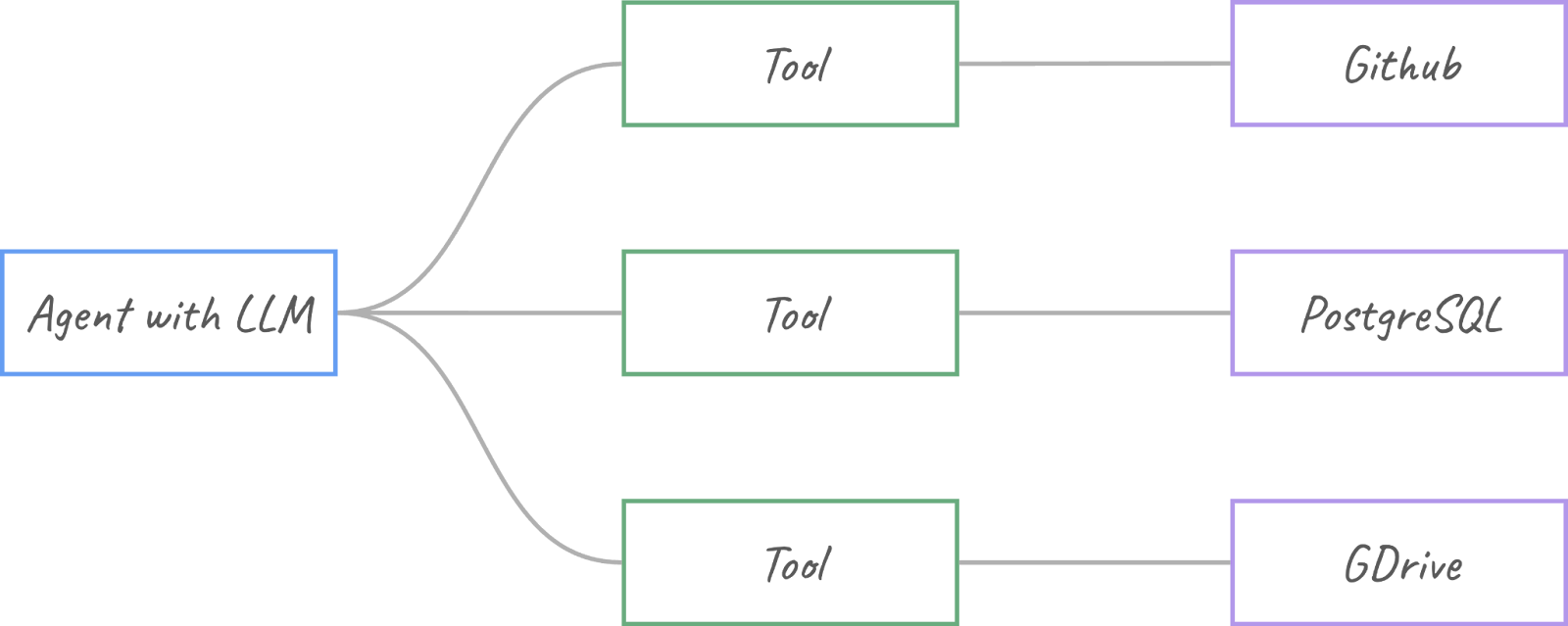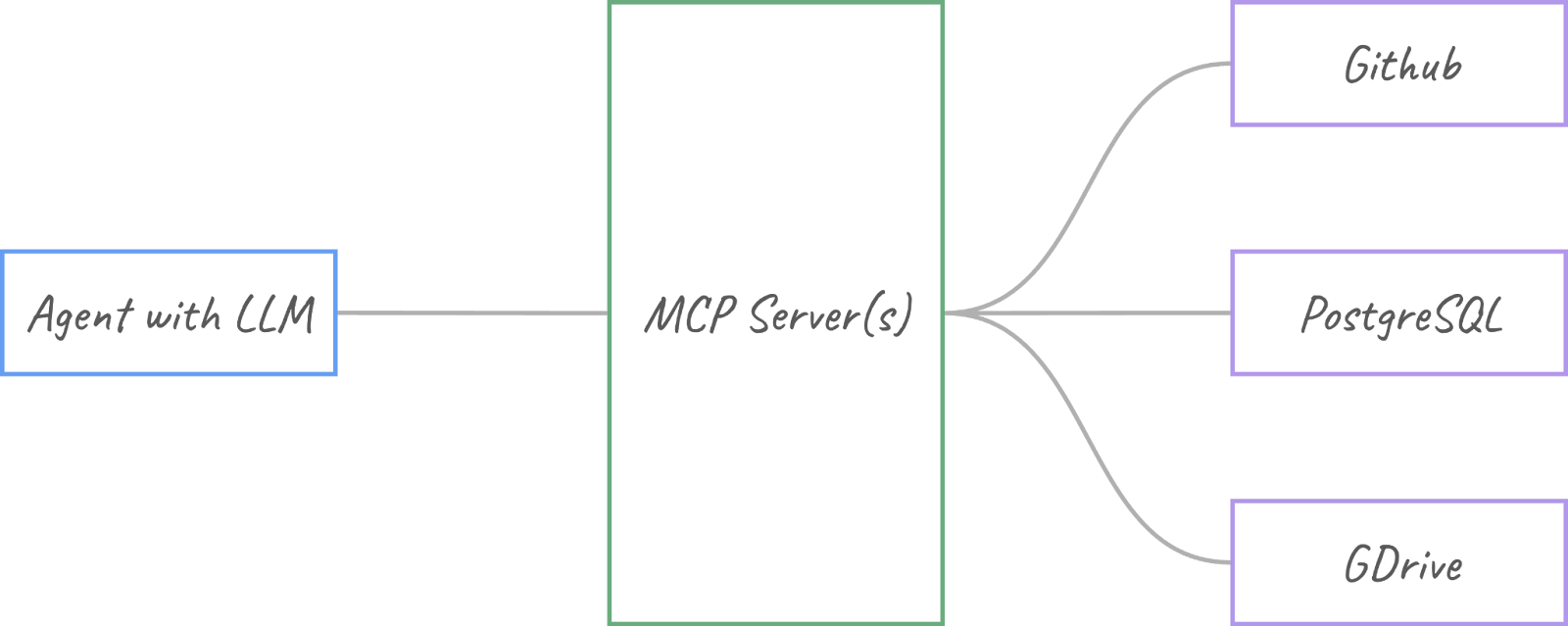The AI agents are now everywhere. There are thousands of agents today that can book a hotel, write code, diagnose diseases. Each is built differently, with various tooling and integrations powering it. Tooling is the secret sauce that is enabling agentic workflows. With tools agents fetch the data, interact with APIs, talk to complex systems.

Large Language Models (LLMs) are not deterministic. Now we are also adding tools that behave differently. One tool that talks to PostgreSQL databases might do it in a different way than the other. Multiply this difference by the non-deterministic nature of LLMs and get some chaos into the strict world of technologies.
Hello, Model Context Protocol!
Model Context Protocol (MCP) was introduced by Anthropic in November 2024. It is an open standard that enables seamless integration between LLMs and external data sources and tools. Its main job is to standardize context augmentation to improve agentic capabilities.
Think about it this way: right now, getting different AI helpers to talk to your everyday stuff – like booking systems, your company's data, or even just sending an email – can be a real headache. It's like trying to plug different shaped chargers into the same socket. MCP is trying to create a universal adapter. This means in the future, you might see AI agents that just work with the tools you already use, without a ton of techy fuss. Imagine asking an AI to book your travel and it just does it, talking smoothly to the airline and your calendar without needing a developer to make it happen. That's the kind of seamless experience MCP could unlock for everyone, not just the folks deep in the code.

I was experimenting with agents before. Even with agentic frameworks the implementation of how LLMs talk to my tools was different. Integrating it into the flow of another application was a coding task, not the seamless journey. As the world has seen in the past - standardization is inevitable. MCP builders from all over the world can share their implementations now. The best ones are going to get the love of the community and become a standard across various applications.
MCP today is one of the hottest topics in AI space and interest in it spiked since it started in November last year:

You can already find curated lists of hundreds of MCP servers for different applications:
And even MCP Marketplaces: mcpmarket.com and mcp.so
There are servers developed by vendors, like Zapier, Grafana, Mailgun, Aiven. There are community servers where creativity is unlimited - you can find a server for AWS, Google Cloud, multiple variations of servers for Kubernetes, MySQL and other popular technologies and applications.
All to standardize context augmentation and agentic workflows.
The Now
Vendors
As we’ve seen above, vendors are already creating their own MCP servers. Agents are here, it seems they will stay and they will grow in numbers and capabilities. It seems that having API exposed is enough for Agents, but MCP shows that there can be one more iteration of simplification.
The growth of AI agents is fueling growth of other technologies. With implementation of common protocols we will see an amplification of growth and its acceleration in all areas.
Some vendors might wait till somebody else is going to create an MCP server for their tech, but if the tech does not have enough traction there is a risk of being left out, remain on the sidelines of progress.
Agent frameworks and tools
It is not a surprise that Anthropic’s tools have integration with MCP (like Claude Desktop). But other tools are catching up:
- Cursor allows users to connect external tools with MCP
- LangChain MCP adapters to work with LangChain and LangGraph
- Microsoft’s AutoGen has an MCP adapter as well
Infrastructure-as-a-code
Tech vendors were standardizing with APIs, libraries and Infrastructure-as-a-code tools (like Terraform modules). This was good enough for developers. Now it is time to standardize for an era of AI Agents. MCP provides a good opportunity to do that.
The future
Challenges
Even with a cool idea like MCP, there are bumps in the road. Getting everyone to agree on one standard when there are already so many ways of doing things is a big task. Plus, as more and more MCP servers pop up, making sure they all play nicely together and are secure could become a real challenge. And you've got to wonder if a few big players might end up dominating the MCP space, which could limit choices down the line. So, while MCP is super promising, it's worth keeping an eye on how it all shakes out and what hurdles the community will need to overcome to make it truly universal and beneficial for everyone.
More protocols
We are just at the very beginning of the AI era. MCP is quite fresh. More protocols might appear and just a few of them are going to stay. Remember when TCP/IP was not a thing and there were a few competing networking protocols that different companies used?
Already today there is an A2A protocol created by Google that “helps agents across different ecosystems communicate with each other”.
It might be that MCP is not ideal and there will be MCP v2 or some other better, more flexible and more reliable protocol.
Converge
We will see more and more MCP (or other protocol) servers, but eventually they will converge and only a few are going to stay. Most likely there will be some vendors who are going to step in and maintain those with the help of the community. Like for Kubernetes I would expect CNCF AI working group to support one of the solutions. For MySQL, Percona or Oracle might step in. And so on.
Conclusion
These AI agent things are clearly sticking around, and the current headache of trying to make them play nice with our existing tech is a real issue. That's where MCP feels different – it's not just some hyped-up tech; it feels like a key piece for actually building a future where AI fits smoothly into everything. Sure, there'll be bumps along the way as this stuff figures itself out, but the drive to get everyone on the same page with protocols like MCP shows we're serious about making these agents genuinely useful, day in and day out, no matter what industry you're in. Keep an eye on MCP or similar solutions, especially if you are building something for tech personas.